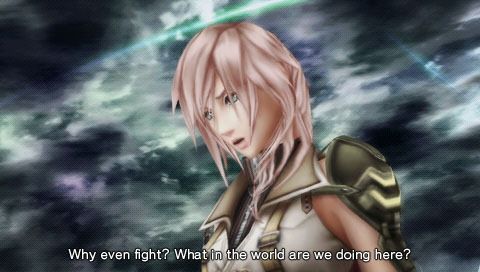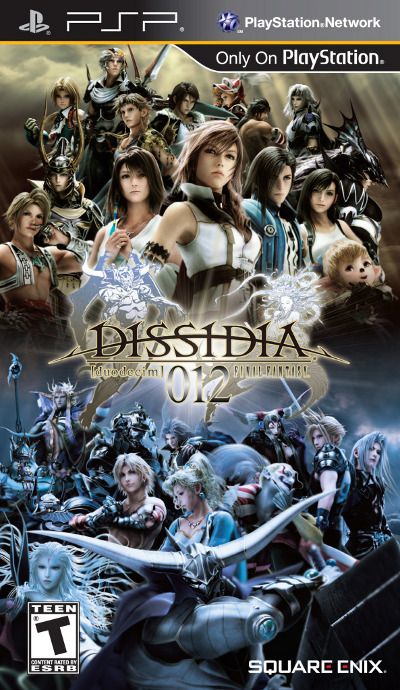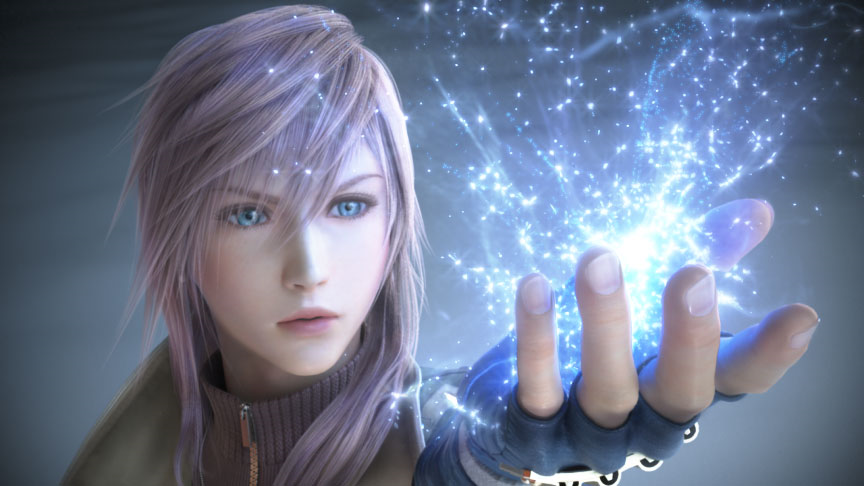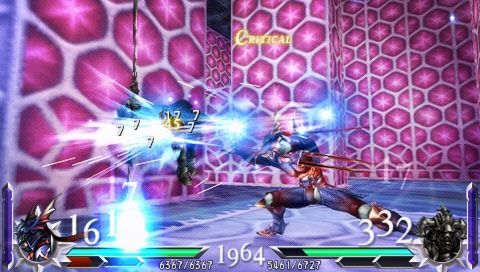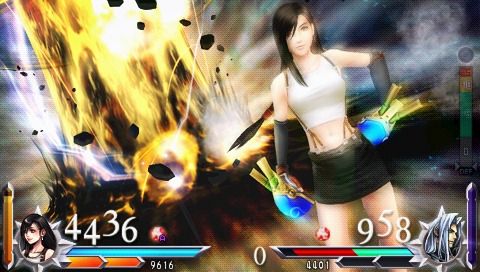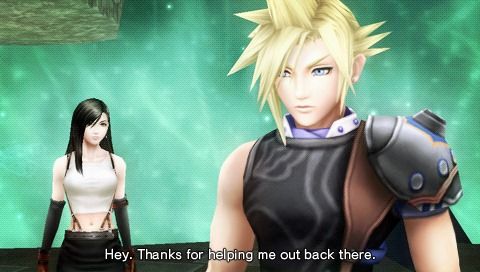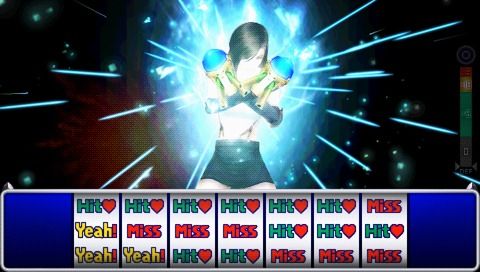Over the years, the Final Fantasy franchise, as a whole, has branched off in many directions from its turn-based roots – from shooters to MMOs to action-based adventures. The Dissidia spin-offs tend to take the franchise into the fighting genre more than others, although overall it feels like a very stylized action-RPG that pits characters from a wide variety of Final Fantasy games against each other. Unfortunately, there is ultimately only so much nostalgia and fan service can cover when the game mechanics and story are perplexing to the point that the game falls apart. Read on to find out what I really thought of this head-spinning adventure.
It seems the story itself was forced upon the game just to have a reason for all these characters from various different Final Fantasy titles to end up together in one narrative. This works – to a degree. The concept is a simple one – good and evil characters from the various Final Fantasy titles have been summoned to participate in this battle that pits the forces of Cosmos versus the minions of Chaos. This is exactly like the first Dissidia title, even though Duodecim is technically a prequel.
Aside from that basic set-up, the story is madly confusing and vague. It somehow attempts to fight against itself at every turn, and here’s what I mean by that: The idea of a story is to get the player involved either through the narrative itself, or the characters that make up its framework. Unfortunately, neither part works here. The story is just plain unintelligible, and that may be putting it nicely. Seriously, what in the name of the great Chocobo King is going on here?! I have no frakking idea; none whatsoever, after 25 hours of playing this game. The characters, while charming on the surface in the various cut scenes that you’ll find yourself going through, ultimately are about as deep as a "Roadrunner" cartoon.
The story tries so hard to be interesting and unique, that it completely fails at both aspects. Let’s get one thing straight: Vague, convoluted, completely confusing narratives that seem to exist for no other reason than to drag the player by the ear kicking and screaming through a game in hopes that it all makes sense in the end have no reason to be written. The characters exist solely to fight in this battle of good versus evil. That is all they talk about in their uninteresting ramblings, and it interests me about as much as getting my arm amputated by a chimpanzee.
The only good thing about the characters in this game is that they are simply there. It’s fan service, straight up. You’ll get to play with the likes of Tifa, Yuna, Vaan, Lightning, Laguna and others – some new to this title, some carried over from the first Dissidia. It is fun to see the bits and pieces of interaction they have with one another, and even to hear the voices of some that may not have had them in their respective titles (Laguna’s voice and attitude fits my perception of him perfectly, by the way).
Fortunately, the combat itself is where things start to pick up a bit. But only to a point. The part of the game most people will latch on to at various degrees is the very fast and fluid battles. The flow of the game goes something like this: You wander around the over-world looking for and unlocking gates that have been tainted by Chaos. When you enter these gates, you get sort of a tactical map view, where you hop from platform to platform. You can visibly see things like supporting characters, treasure chests and, most importantly, battles. When you move to a square occupied by an enemy, a real-time battle begins. Here I use the term “real-time” very loosely.
At the beginning of the game you can chose between real-time action and real-time turn-based (read: RPG) battle systems, and I went with the latter. This, in my opinion, made things much, much easier. The first Dissidia only had real-time action battle available, so you were responsible for the direct and manual control of your character. The RPG battle system option added here takes the direct control of your character out of your hands, and tasks you with simply inputting commands. Even making the puzzling combat easier in this manner, it was still a tough bull to reign in and is never very user friendly at all.
You do have a lot of different available actions at your disposal, from individual attacks and abilities, to simply hitting the Triangle button to move when various arrow icons pop up on screen. The goal, however, is to attack the opponent’s Bravery, which builds up your attack meter. Then, once it gets to a certain point, use an actual HP attack to clobber the enemy into oblivion. Even though there are some tutorials, these do not help a new player (or one versed in any sort of action RPG) at all. I would just sit there, staring at the screen hitting random buttons, not having any idea what was going on in front of me. You know what? That was actually kind of fun.
The issue occurs a couple hours into the game when you actually have to know what’s going on in battle. This is where the tutorials really screw you over, because they don’t illustrate clearly exactly how battles are supposed to be fought. There’s also so many moves and situations you find yourself in – which are covered quickly by a text tutorial – that it’s near impossible to remember what to do in each and every one of them. And then, when that happens, you get the spiky hair beat out of you and it’s game over.
What I did enjoy about the battles, even past the initial “hey, this is pretty cool” stage, is the new assist feature which was added in Duodecim. This is where another character comes in to clobber the enemy for you in sort of a tag-team attack. While initially this is a manual process, eventually you get the ability to have this happen automatically. Also, during the course of winning battles and opening chests, you’ll receive many, many items, most of which you probably will never bother using or figuring out. Inventory management is kind of a pain because there is just so much crap for you to get.
So, by now you’ve realized that I didn’t like the story and the battle system was only so-so simply because of its over-complex nature. What I did enjoy about the game was the visuals. Say what you will about Square-Enix, but when it comes to making a game look good, they’re at the front of the pack. They seriously have the best looking games on the PSP; they know how to milk that aging system for all its worth, and that’s a great thing. The cut scenes and CGI sequences look fantastic, which makes up for the slight lack of polish in the world. The over-world map seems so boring because there really isn’t anything going on, and the only reason it’s there is for you to travel from Chaos gate to Chaos gate.
If you’re willing to take the extra time, there’s also the scenario creator, which allows you to create new missions of your own. It’s a pretty deep and robust system for those interested. You also have multiplayer available to you, where you can play with three other friends throughout many stages, using the same battle system that you tromp through the single player with. I don’t have any friends, so I wasn’t able to check out the multiplayer, but hey, it adds to the already packed full list of content this game has to offer.
Ultimately, I find it hard to get over the steep learning curve and the completely lackluster and boring plot. If you can pick up the battle system and run with it, you should be good, as that will likely keep you entertained through the labyrinthine narrative which tends to bore after a while just because you can never quite figure out what is going on. There really is a ton of content packed into this title, but the issue isn’t with the content, it’s with how well that content is executed. Two of the biggest draws to any game – the story and the battle system – are so confusing and sinuous that it is simply too difficult to get into. I’ve been playing Final Fantasy games for 15 years and it’s pretty sad that the biggest thing I took out of Dissidia [012] Duodecim was the fan service. That’s it.
The amount of enjoyment you get out of this game will be directly linked to how well you can pick up on the battle system and if you can make heads or tales of the story, and that is way too random for my tastes. It screams bad game design on all fronts, and I can’t really in good conscience praise the game for that nostalgic fan service and the visuals alone, because ultimately those things also tend to fall flat because what should be the meat and potatoes of the game just isn’t executed well. It’s quite disappointing to me, as I really wanted to like this game, but in the end, I just came away with a bad taste in my mouth.
-
Game: Dissidia [012] Duodecim: Final Fantasy
- Platform Reviewed: PSP
- Developer: Square-Enix (1st Production Department)
- Publisher: Square-Enix
- MSRP: $29.99
- Release Date: March 22, 2011
- Review Copy Info: A copy of this title was provided to DualShockers, Inc. by the publisher for the purpose of this review.

